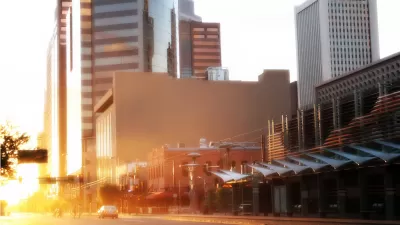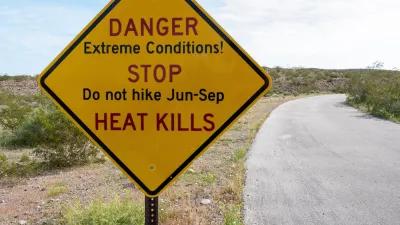As more extreme temperatures lead to an alarming rise in heat-related deaths across the country, Phoenix is taking action with the nation's first public heat response office.

As one of the nation's fastest-warming cities, Phoenix has seen a sharp rise in heat-related deaths as extreme temperatures become more commonplace. To address this growing public health crisis, the city has created the first publicly funded Office of Heat Response and Mitigation to tackle the problem of extreme heat and prevent heat deaths, which reached almost 500 in 2020. Jessica Kutz spoke with David Hondula, the director of the new office, to get a sense of how the city plans to develop a more comprehensive heat mitigation policy.
Hondula says the department will focus on coordinating a variety of short- and long-term heat mitigation strategies with other city departments and prioritizing cooling methods that meet local needs, such as increasing the city's tree canopy, installing cool pavement, and opening cooling centers for residents with no access to safe spaces in the extreme heat.
Hondula acknowledged the unequal heat burden faced by low-income communities, saying that his office will "steer the city’s investments in mitigation and response to the communities where there is the greatest need."
Earlier this year, Phoenix pledged to commit to 'tree equity' by 2030 by planting more trees in underserved neighborhoods and closing the green gap between high-income and low-income communities, where lack of shade exacerbates the effects of extreme heat.
FULL STORY: How to cool one of the fastest-warming cities in the West

Planetizen Federal Action Tracker
A weekly monitor of how Trump’s orders and actions are impacting planners and planning in America.

San Francisco's School District Spent $105M To Build Affordable Housing for Teachers — And That's Just the Beginning
SFUSD joins a growing list of school districts using their land holdings to address housing affordability challenges faced by their own employees.

The Tiny, Adorable $7,000 Car Turning Japan Onto EVs
The single seat Mibot charges from a regular plug as quickly as an iPad, and is about half the price of an average EV.

With Protected Lanes, 460% More People Commute by Bike
For those needing more ammo, more data proving what we already knew is here.

In More Metros Than You’d Think, Suburbs are Now More Expensive Than the City
If you're moving to the burbs to save on square footage, data shows you should think again.

The States Losing Rural Delivery Rooms at an Alarming Pace
In some states, as few as 9% of rural hospitals still deliver babies. As a result, rising pre-term births, no adequate pre-term care and "harrowing" close calls are a growing reality.
Urban Design for Planners 1: Software Tools
This six-course series explores essential urban design concepts using open source software and equips planners with the tools they need to participate fully in the urban design process.
Planning for Universal Design
Learn the tools for implementing Universal Design in planning regulations.
Smith Gee Studio
City of Charlotte
City of Camden Redevelopment Agency
City of Astoria
Transportation Research & Education Center (TREC) at Portland State University
US High Speed Rail Association
City of Camden Redevelopment Agency
Municipality of Princeton (NJ)





























